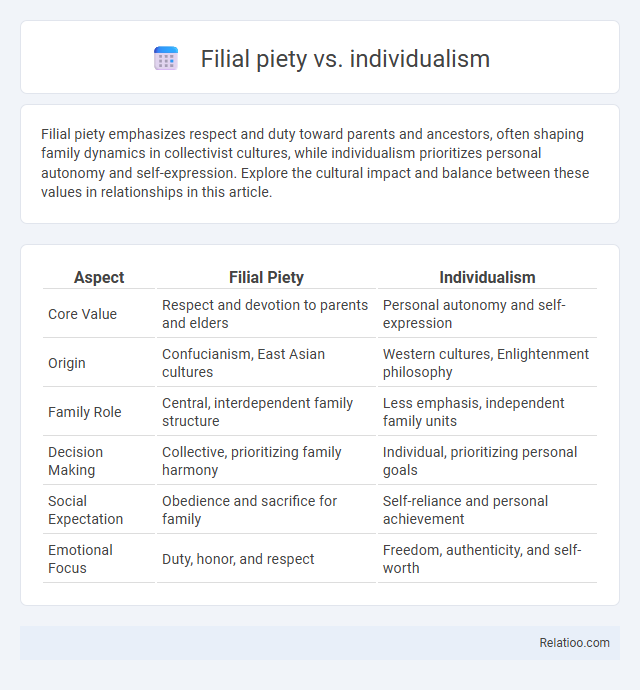Filial piety emphasizes respect and duty toward parents and ancestors, often shaping family dynamics in collectivist cultures, while individualism prioritizes personal autonomy and self-expression. Explore the cultural impact and balance between these values in relationships in this article.
Table of Comparison
| Aspect | Filial Piety | Individualism |
|---|---|---|
| Core Value | Respect and devotion to parents and elders | Personal autonomy and self-expression |
| Origin | Confucianism, East Asian cultures | Western cultures, Enlightenment philosophy |
| Family Role | Central, interdependent family structure | Less emphasis, independent family units |
| Decision Making | Collective, prioritizing family harmony | Individual, prioritizing personal goals |
| Social Expectation | Obedience and sacrifice for family | Self-reliance and personal achievement |
| Emotional Focus | Duty, honor, and respect | Freedom, authenticity, and self-worth |
Defining Filial Piety and Individualism
Filial piety, rooted in Confucian tradition, emphasizes respect, obedience, and care for one's parents and ancestors, fostering family cohesion and intergenerational support. Individualism prioritizes personal autonomy, self-expression, and independence, often valuing individual goals over familial obligations. The tension between filial piety and individualism arises in balancing collective family responsibilities with personal freedom and self-fulfillment.
Historical Roots of Filial Piety
Filial piety has deep historical roots in Confucian philosophy, emphasizing respect and duty toward one's parents and ancestors as foundational to social harmony in many East Asian cultures. Individualism, emerging strongly in Western thought during the Enlightenment, prioritizes personal autonomy and self-expression over collective familial obligations. Balancing filial piety with individualism challenges traditions, requiring you to navigate ancestral expectations while asserting personal identity in a globalized world.
Origins and Rise of Individualism
Filial piety, rooted in Confucian traditions, emphasizes family loyalty and respect for elders, shaping societal norms in East Asia for centuries. Individualism, originating from Enlightenment ideals in the West, rose as a reaction to collectivist frameworks, promoting personal autonomy and self-expression. This philosophical shift emerged alongside industrialization and democratization, challenging the hierarchical values of filial piety by prioritizing individual rights and freedoms.
Key Values and Beliefs: A Comparative Overview
Filial piety emphasizes respect, obedience, and care for parents, rooted in Confucian values prioritizing family harmony and collective well-being, while individualism centers on personal freedom, self-expression, and autonomy, often valuing independence over family obligations. Your cultural context shapes how these core beliefs influence social responsibilities, with filial piety fostering intergenerational support and individualism promoting self-reliance. Understanding these contrasting value systems highlights the balance between maintaining family duties and pursuing personal goals.
Family Dynamics: Collectivist vs. Individualist Perspectives
Filial piety, central to collectivist cultures, emphasizes family loyalty, respect, and obligation, shaping intergenerational relationships and decision-making within a hierarchical family structure. Individualism prioritizes personal autonomy and self-expression, often challenging traditional filial expectations by promoting independent choices in family roles and care. Family dynamics in collectivist societies focus on group harmony and duty, while individualist perspectives support individual rights and personal fulfillment, influencing caregiving, inheritance, and emotional bonds.
Social Expectations and Personal Freedom
Filial piety emphasizes respect and obedience to parents as a social expectation rooted in collectivist cultures, often limiting Your personal freedom by prioritizing family duties over individual desires. Individualism promotes self-expression and autonomy, encouraging individuals to pursue personal goals even if they conflict with traditional family roles. Balancing filial piety and individualism requires navigating societal pressures while asserting Your independence, highlighting the tension between collective obligations and personal liberty.
Filial Piety in Modern Societies
Filial piety remains a foundational value in many modern societies, especially in East Asian cultures, where respect and care for elders are deeply ingrained in family dynamics and social expectations. Despite the rise of individualism emphasizing personal autonomy and self-expression, filial piety continues to influence intergenerational relationships, often manifesting in caregiving responsibilities and financial support for aging parents. Balancing filial piety with individualistic values presents challenges, yet many modern families navigate this by integrating traditional notions of duty with contemporary ideals of independence and mutual respect.
The Impact of Individualism on Family Structure
Individualism reshapes traditional family structures by prioritizing personal autonomy over collective family obligations, often leading to a decline in filial piety practices. The emphasis on self-reliance and individual goals reduces intergenerational dependency, weakening extended family bonds and altering caregiving dynamics. This cultural shift impacts social support systems, challenging conventional expectations of elder care and family responsibility in societies valuing filial piety.
Cross-Cultural Conflicts and Adaptation
Cross-cultural conflicts arise when filial piety, emphasizing family loyalty and elder respect in many Asian cultures, clashes with Western individualism prioritizing personal autonomy and self-expression. Your ability to navigate these divergent values requires cultural adaptation strategies such as negotiating family expectations and asserting individual goals while respecting tradition. Understanding the semantic nuances of filial piety and individualism fosters meaningful dialogue and reduces intercultural tensions, promoting harmonious relationships in multicultural settings.
Balancing Tradition and Independence in Contemporary Life
Balancing tradition and independence in contemporary life requires integrating filial piety's respect for family with the individualism that emphasizes personal autonomy and self-expression. You can honor family obligations while pursuing personal goals by setting boundaries that respect both cultural expectations and individual needs. This approach fosters harmony between collective familial duties and the modern emphasis on self-identity, promoting well-being and social cohesion.

Infographic: Filial piety vs Individualism
 relatioo.com
relatioo.com